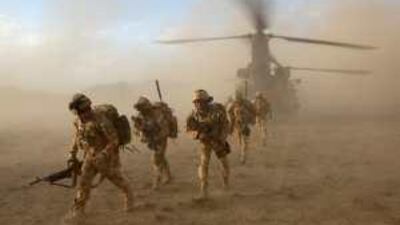LONDON // Britain's military mission in Afghanistan is in danger of failing because its soldiers have been told to fulfil too many widely differing tasks, according to an influential Commons' committee. A report from the foreign affairs committee proposes that Britain give up its lead role in counter-narcotics - described by the MPs as "a poisoned chalice" - and instead concentrate solely on the fight against the Taliban.
Mike Gapes, the committee chairman, told the BBC yesterday that trying to stop poppy growing and heroin production was "an impossible job for one country to do" and it should be handed over to the multinational force and the United Nations. "This issue of counter-narcotics, the heroin poppies, is a serious problem but it is not the main issue that we face in Afghanistan," he told the BBC. "The main issue is the security and the threat coming from Afghanistan, once again, becoming a terrorist base."
According to the report, the UK's military effort in Afghanistan had been undermined by poor government planning and a lack of realistic strategy and direction. The committee of MPs said that, since deploying to Afghanistan in 2001, the UK force, currently comprising more than 9,000 servicemen, had suffered from "significant mission creep". An ever-growing list of tasks - which include state-building, human rights, anti-narcotics and counter-insurgency - had made it difficult for the government to explain the purpose of Britain's mission, said the report.
"We recommend that, in the immediate future, the government should refocus its efforts to concentrate its limited resources on one priority, namely security," it said. Britain's deployment to Helmand province had been "undermined by unrealistic planning at senior levels, poor co-ordination between Whitehall departments and, crucially, a failure to provide the military with clear direction". Efforts to adopt a "comprehensive approach" linking security with development and good governance in Helmand were "faltering" because the security situation was too unstable.
The all-party committee was also critical of some of Britain's Nato allies for failing to commit sufficient troops to fighting the Taliban, particularly in the south of the country where the MPs said the security situation would remain "precarious" for some time to come. "There is a real possibility that without a more equitable distribution of responsibility and risk, Nato's effort will be further inhibited and its reputation as a military alliance, capable of undertaking out-of-area operations, seriously damaged," the report said.
Mr Gapes, a Labour MP, told the BBC some Nato countries were "not pulling their weight". He added: "Certain countries are taking serious casualties and are in the areas where there is very much more fighting and danger ? Ourselves, the Americans, Canadians, Dutch, the Danes the Estonians have all taken on a significant burden militarily." Almost 200 UK troops have been killed in Afghanistan with the mortality rate spiking in recent months. In July, Britain suffered its worst death toll with 22 killed. The report suggested that the continued instability was due in part to the failures of the international community, although the MPs insisted there could be "no question" of abandoning Afghanistan.
They said the "only realistic option" for ensuring the country does not fall back into the hands of those who would use it for attacks on the West was an Afghan-led political settlement with popular support. "We recognise that although Afghanistan's current situation is not solely the legacy of the West's failures since 2001, avoidable mistakes - including knee-jerk responses, policy fragmentation and overlap - now make the task of stabilising the country considerably more," the report stated.

